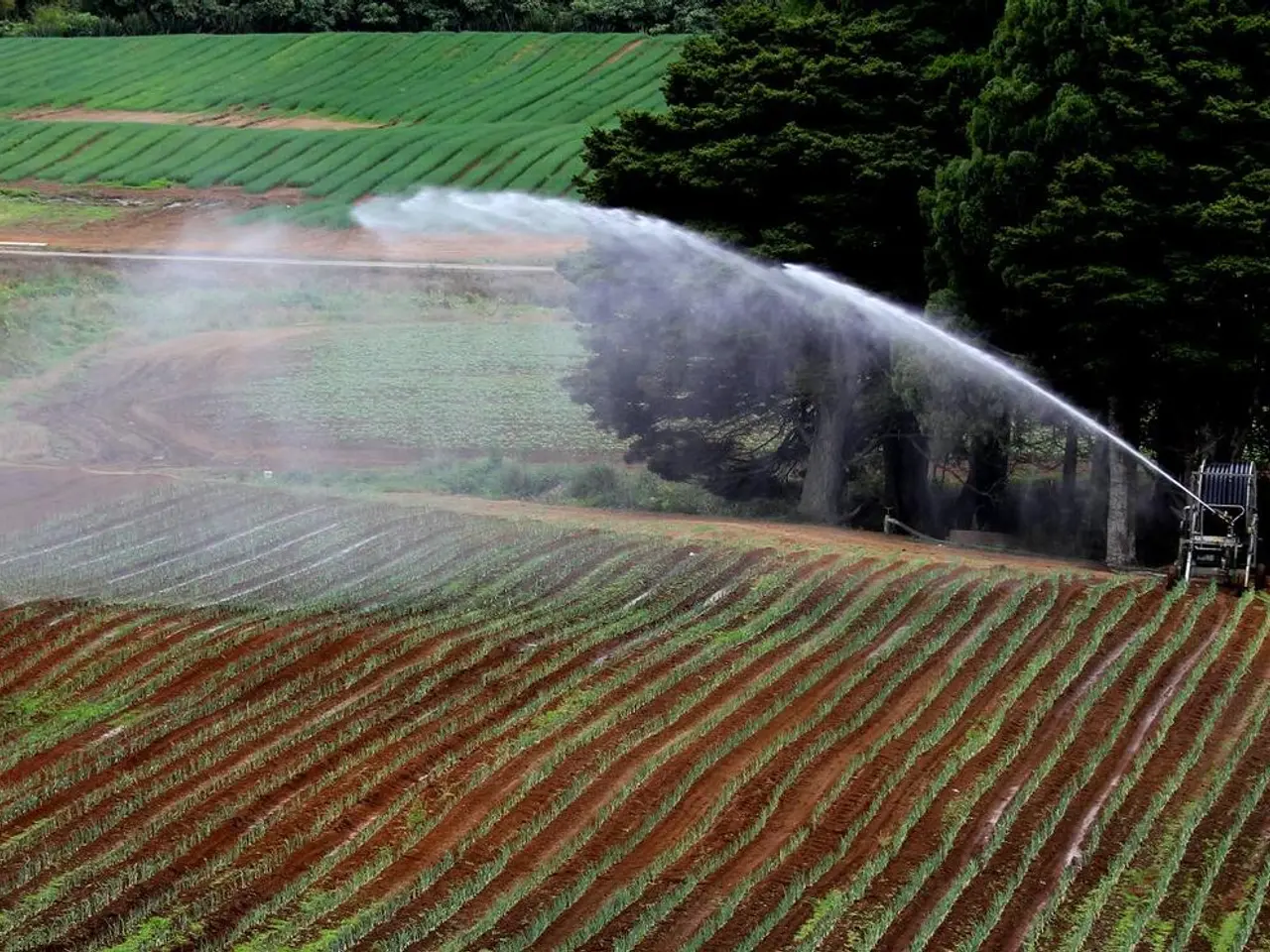2025's Sustainable Agriculture Summit urges Eco-friendly Expansion as the driving force for India's Economic Advancement
India's Agricultural Growth Embraces Sustainability and Farmer Welfare
India's agricultural sector is gearing up for a transformative journey, aiming to contribute significantly to the country's long-term prosperity and economic future. The 2nd Sustainable Agriculture Summit & Awards 2025, organised by Sustainability Matters and IndiAgri, brought together leaders, farmers, scientists, and bureaucrats to discuss and celebrate this shift.
The summit, supported by the Indian Railway Finance Corporation, Godrej Agrovet, IPL Biologicals, SIDBI, and Hindustan Urvarak & Rasayan Limited (HURL), was inspired by Prime Minister Narendra Modi's vision of a Viksit Bharat, where agriculture is a catalyst for sustainable growth.
The awards ceremony recognised exemplary work across multiple categories, honoring achievers such as Godrej Agrovet, IPL Biologicals, HURL, SeedWorks International Limited, Bihar Agricultural University, Love Kumar, Agricultural Technology Management Agency (ATMA), Agri Entrepreneur Growth Foundation, Dhaksha, and the Federation of Seed Industry of India.
Under the banner of Krishi 2047, the aim is to document what's working on the ground and build a platform for dialogue, recognition, and policy linkages that can take these models national.
The summit highlighted the importance of sustainable agriculture, environmental balance, farmer-centric policies, technology adoption, economic inclusion, and global competitiveness in ensuring India's agricultural growth.
Emphasizing climate-smart farming methods, precision agriculture tools, and water conservation efforts have improved productivity and resource efficiency, reducing environmental impact and enhancing resilience to climate risks. Keeping farmers at the heart of economic transformation, along with raising minimum support prices, investing in irrigation, and supporting diversification into allied sectors such as livestock and horticulture, raises farmer incomes and welfare.
Adoption of digital agriculture platforms, mechanization, cold chain infrastructure, and agro-textile industry growth improve yields, quality, and market access, boosting export potential while reducing import dependency. Strengthening agriculture fortifies national stability by sustaining the livelihood of 42% of India’s population, increasing rural incomes, and creating employment opportunities beyond farming.
Sustainable agricultural growth with improved traceability and quality is driving export growth to non-U.S. markets like the EU and ASEAN by 25%, increasing foreign exchange earnings and India's position in global agri-trade.
Union Minister Ramdas Athawale emphasized the importance of keeping farmers at the center of economic transformation for India's growth. Manoj Kumar Dubey, Chairman & Managing Director of Indian Railway Finance Corporation, stressed the need for the private and public sectors to work together to unlock capital for green and farmer-centric innovations.
Siba P Mohanty, Managing Director of Hindustan Urvarak & Rasayan Limited (HURL), stressed the role of responsible input management and water stewardship in securing the future of Indian agriculture. Dr Rajendra Prasad, General Manager & Regional Head of SIDBI, emphasized the importance of leveraging resources from international, multilateral, and bilateral partners to fund mitigation projects addressing climate and sustainability challenges.
District administrations have been central to introducing innovations that address climate and resource challenges and diversify farm incomes in regions dependent on traditional crop cycles. Ms Deepshikha, IAS, Collector & District Magistrate of Ferozepur, Punjab, is promoting chilli cultivation in her district to boost farmer welfare and improve incomes, soil health, and reduce environmental stress.
In summary, India’s roadmap to becoming the world’s largest economy by 2047 hinges on agriculture that is sustainable, inclusive, and technology-driven, with direct benefits to farmer welfare—ensuring food security, environmental sustainability, rural prosperity, and global economic competitiveness. Financing climate-smart agriculture, according to Manoj Kumar Dubey, is an investment in India's economic future.
- India's agricultural sector seeks to contribute significantly to the country's long-term prosperity and economic future, aiming to become a catalyst for sustainable growth.
- The 2nd Sustainable Agriculture Summit & Awards 2025, organized by Sustainability Matters and IndiAgri, brought together various stakeholders to discuss and celebrate the shift towards sustainable agriculture.
- The summit highlighted the significance of sustainable agriculture, economic inclusion, technological adoption, and global competitiveness in ensuring India's agricultural growth.
- Emphasizing climate-smart farming methods, precision agriculture tools, and water conservation efforts can improve productivity, reduce environmental impact, and enhance resilience to climate risks.
- Strengthening agricultural infrastructure, such as digital agriculture platforms, mechanization, cold chain, and agro-textile industries, improves yields, quality, and market access, boosting export potential while reducing import dependency.
- Sustainable agricultural growth with improved traceability and quality drives export growth to non-U.S. markets like the EU and ASEAN by 25%, increasing foreign exchange earnings and India's position in global agri-trade.
- Union Minister Ramdas Athawale emphasized the importance of keeping farmers at the center of economic transformation, while Manoj Kumar Dubey highlighted the need for private and public sectors to work together to fund green and farmer-centric innovations.
- District administrations introduce innovations to address climate and resource challenges, diversify farm incomes, and improve the welfare of farmers and the environment, demonstrating that sustainable and technology-driven agriculture can lead to food security, environmental sustainability, rural prosperity, and global economic competitiveness.




